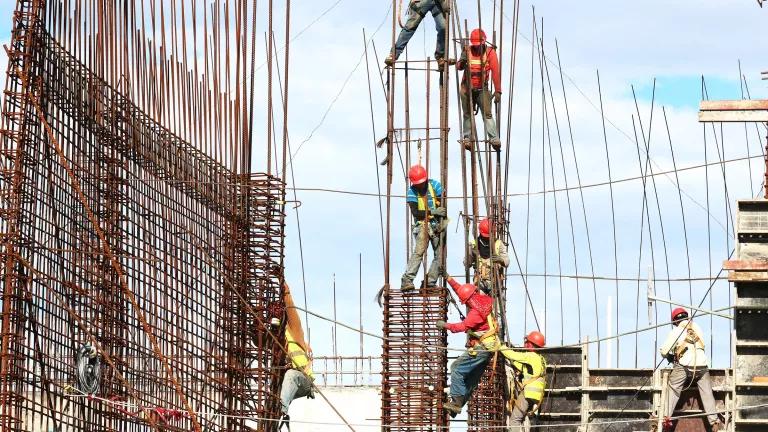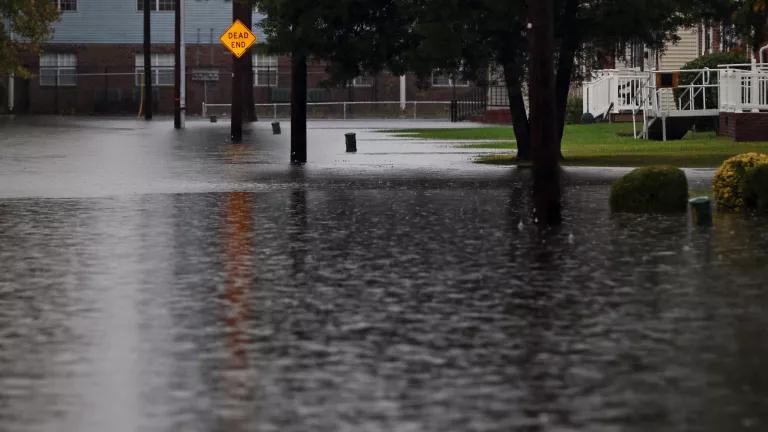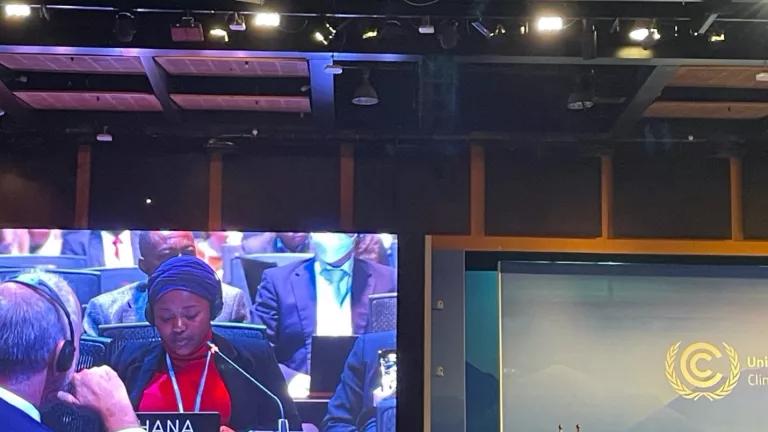The EPA Announces More Than $325 Million in Landmark Community Change Grants Awards
The grants will help underinvested climate and and environmental justice communities tackle pollution and climate crises.
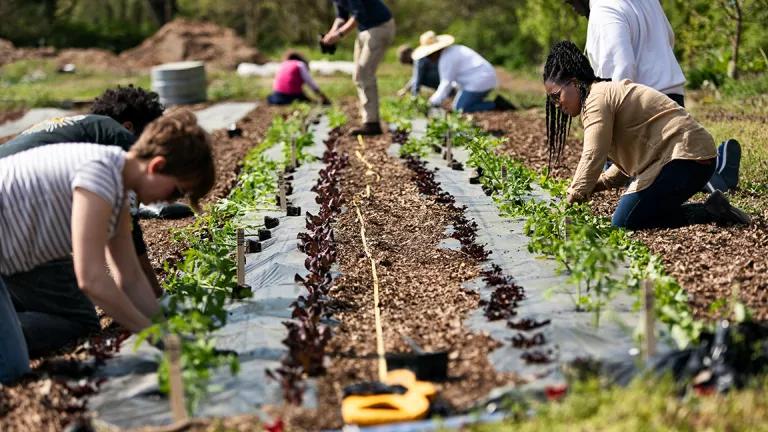
Volunteers planting seedlings at a community garden
Sean Locke/Stocksy
The U.S. Environmental Protection Agency (EPA) announced more than $325 million in its first tranche of historic Community Change Grants. The Community Change Grants (CCG) Program, developed through the administration’s Justice40 Initiative, is the single-largest federal investment in environmental justice and climate justice history.
The CCG Program funds projects that tackle legacy pollution, increase community climate resilience, and build long-term community capacity on climate and environmental justice issues. These projects are intended to be implemented in environmental and climate justice communities to address legacy harm, health, and climate inequities and create lasting pathways to more equitable and representative governance.
The program has awarded funds through two types of grants:
Track I grants, from $10–$20 million each, must include at least one of eight climate action strategies and at least one of four pollution reduction projects that community members develop and implement themselves.
Track II grants, from $1–$3 million each, support equitable community engagement processes that create pathways for communities to have a meaningful voice in government decision-making processes.
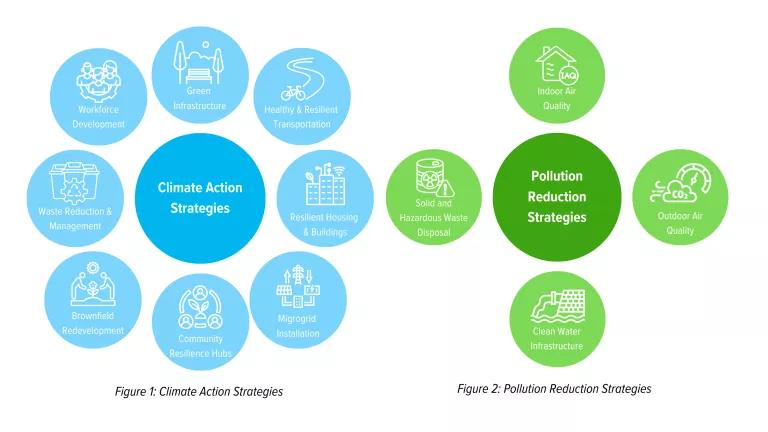
A hallmark program of the federal Justice40 initiative, which delivers at least 40 percent of benefits to disadvantaged communities, the Community Change Grants must be implemented in “disadvantaged communities” or DACs. To apply, the applicant must be a community-based organization (CBO) or 501(c)(3) and partner with another CBO, academic institution, or local government and meet the EPA’s threshold for a DAC through the Climate and Economic Justice Screening Tool and the Inflation Reduction Act Disadvantaged Communities Map. This momentous amount of federal funding flowing directly to communities could be the catalyst needed for under-resourced environmental justice and climate justice organizations to address historic harms, legacy challenges, and inequitable burdens and build up their capacity for future years of work.
Unlike many other federal programs, the CCG directs funds specifically to nonprofit organizations that have been in the community and have a track record of trusted relationships with community members and relevant successes over the years. “By directing much-needed resources to environmental justice, frontline, and marginalized communities, the Community Change program serves as a model for communities to lead the development and implementation of the projects that address long-standing inequities and result in healthy, climate-resilient, and thriving neighborhoods across the country,” says Manish Bapna, president and CEO of NRDC. These awards are a culmination of NRDC’s work, started in April 2023 in partnership with Equitable & Just National Climate Platform, Environmental Justice Health Alliance for Chemical Policy Reform, and Center for Neighborhood Technology. With these partners, NRDC advocated for the creation of and shaped the program's design, focusing on reducing barriers, supporting community engagement, and increasing equitable access to grants and technical assistance for applicants.
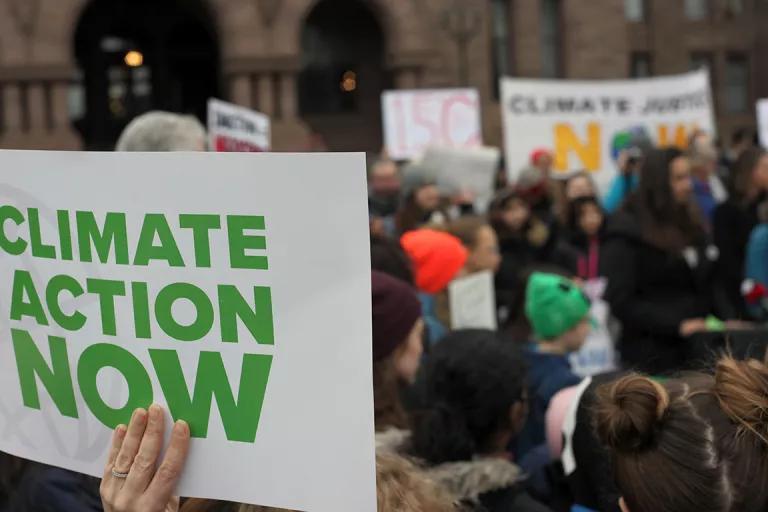
A Fridays for Future climate strike rally
Jasmin Sessler
In partnership with organizations like WE ACT for Environmental Justice and Environmental Protection Network (EPN), NRDC hosts webinars and shares resources to increase access to these grant opportunities. Alongside official Community Change Grants technical assistance offered by EnDyna and other pro bono technical assistance providers like EPN, NRDC’s Environment, Equity & Justice Center has worked with Maya Brennan Consulting to provide a spectrum of support for grant applicants to navigate this federal funding process. NRDC completed narrative support, project development, budget review, and general support for longtime partners and environmental justice organizations and served as an information hub and check-in resource for others. One of the architects of the program during his time at the EPA, Matthew Tejada—currently NRDC's senior vice president, environmental health—reviewed dozens of applications and provided feedback directly to partners. The application process can be tricky and frustrating, particularly for organizations that excel in on-the-ground impact but lack formal fiscal, administrative, and accounting staff.
As the first group of CCG grant awards to be announced, these Track I awards were made across neighborhoods in the United States, from Oregon and California to Idaho, Texas, and Louisiana. The projects begin implementation within the next few months and range from building cooling centers and planting tree canopies to electrifying multifamily homes and installing on-site wastewater treatment systems. Track II community engagement grants were awarded in California, New York, and Ohio. The Inflation Reduction Act–funded program will be continuing to announce awards on a rolling process and is planning to disburse the remaining awards until it reaches its $2 billion total by November 2024.
NRDC is hopeful to see many of its historic, long-term partners and core environmental justice and climate justice partners receive the funding they deserve through the Community Change Grants to address existing inequities and ensure that their communities are healthy, safe, and resilient. “These grants will bring much-needed funding to disproportionately overburdened communities. It will improve and save lives by funding community-driven projects to reduce pollution and improve public health [and] the environment, and strengthen climate resilience in disadvantaged communities overburdened by high levels of pollution and climate risks,” says Byron Gudiel, executive director at the Center for Earth, Energy & Democracy (CEED). “The simple fact is: Everyone deserves to live in a safe neighborhood with clean air and water.”


